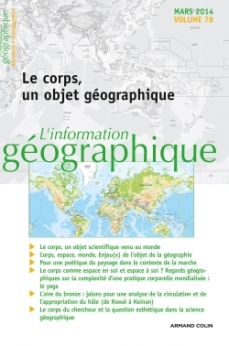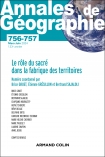
L'information géographique - Vol. 78 (1/2014)
Pour acheter ce numéro, contactez-nous
Recevez les numéros de l'année en cours et accédez à l'intégralité des articles en ligne.
Le corps est longtemps resté un objet discret dans la géographie française, alors qu’il a été très tôt appréhendé par d’autres sciences humaines et sociales. Cela peut s’expliquer par les différentes épistémologies qui se sont succédé depuis Vidal de La Blache au moins jusqu’à l’analyse spatiale plus récente. Le tournant « humaniste » puis « interprétatif », informé par les géographies anglo-saxonnes, a permis de rapatrier la question du corps dans l’intrigue scientifique. Les problématiques liées à l’habiter, à la circulation des normes par la mondialisation, ou encore à la construction des identités, passent de plus en plus régulièrement par le corps, y compris celui du chercheur.
The body remained for a long time a discreet object in the French geography, while it was very early seized by the other human and social sciences. It can be understandable by the various epistemologies which followed one another since Vidal de La Blache at least, up to the more recent spatial analysis. The “humanist” then “interpretative” turning point, informed by the Anglo-Saxon geographies, allowed to repatriate the question of body in the scientific intrigue. Problems connected to dwelling, the circulation of norms through globalization, or to the construction of the identities, pass more and more regularly by the body, including the researcher’s one.

